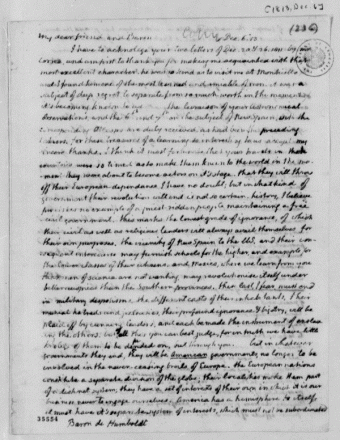Author: President Thomas Jefferson
Date: December 6, 1813.
In this letter, Jefferson discusses his ideas about the acculturation of American Indians after incidents of violence against U.S. citizens by British-allied Indian groups.
Source: The Thomas Jefferson Papers, 1606-1827. Thomas Jefferson to Baron von Humboldt, December 6, 1813. Library of Congress, Manuscript Division. [Electronic Record].
You know, my friend, the benevolent plan we were pursuing here for the happiness of the aboriginal inhabitants in our vicinities. We spared nothing to keep them at peace with one another. To teach them agriculture and the rudiments of the most necessary arts, and to encourage industry by establishing among them separate property. In this way they would have been enabled to subsist and multiply on a moderate scale of landed possession. They would have mixed their blood with ours, and been amalgamated and identified with us within no distant period of time. On the commencement of our present war, we pressed on them the observance of peace and neutrality, but the interested and unprincipled policy of England has defeated all our labors for the salvation of these unfortunate people. They have seduced the greater part of the tribes within our neighborhood, to take up the hatchet against us, and the cruel massacres they have committed on the women and children of our frontiers taken by surprise, will oblige us now to pursue them to extermination, or drive them to new seats beyond our reach. Already we have driven their patrons and seducers into Montreal, and the opening season will force them to their last refuge, the walls of Quebec. We have cut off all possibility of intercourse and of mutual aid, and may pursue at our leisure whatever plan we find necessary to secure ourselves against the future effects of their savage and ruthless warfare. The confirmed brutalization, if not the extermination of this race in our America, is therefore to form an additional chapter in the English history of the same colored man in Asia, and of the brethren of their own color in Ireland, and wherever else Anglo-mercantile cupidity can find a two-penny interest in deluging the earth with human blood. But let us turn from the loathsome contemplation of the degrading effects of commercial avarice.





